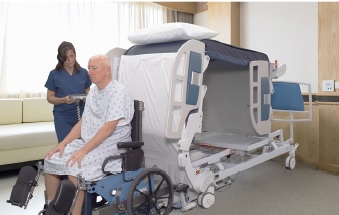
A new bed transfer device makes life easier — and safer — for patients and caregivers. NextHealth, Inc., in partnership with McGowan Institute for Regenerative Medicine affiliated faculty member Rory Cooper, PhD, and team members from University of Pittsburgh’s Human Engineering Research Laboratory (HERL), developed the AgileLife Transfer & Mobility System™ (“TMS”), the only “Zero Lift” transfer and repositioning system that affects better outcomes for immobile individuals, their families, caregivers and their providers through the continuum of care.
“What we are about is providing people devices that allow them to be as independent as possible, and also helping caregivers,” Dr. Cooper, FISA & Paralyzed Veterans of America (PVA) Professor and Distinguished Professor of the Department of Rehabilitation Science & Technology, and professor of Bioengineering, Physical Medicine & Rehabilitation, and Orthopedic Surgery at the University of Pittsburgh, and HERL Founding Director, said to M. Thomas of the Pittsburgh Post-Gazette. HERL has been involved in all aspects of the project, including development, writing software, fabrication and user trials.
Whether manually transferring or repositioning immobile individuals, or using mechanical devices, caregivers are at risk for musculoskeletal injuries. Sometimes these injuries go undetected over time and the compound effect of repeated manual strain can be debilitating. Absenteeism, retraining, compensation claims, permanent disability and early retirement, are some of the avoidable outcomes that generate unnecessary expense. Costs associated with patient transfer incidents are estimated to be $20 billion annually. This healthcare crisis has led to “Zero Lift” legislation being passed in many states. In contrast over a 12-month period, 10,000 transfers and over 20,000 in-bed repositions were completed and verified using the AgileLife TMS™. “Zero” injuries were reported.
The first unit in Pittsburgh was placed in the home of a patient at the VA H.J. Heinz campus in O’Hara Township. He had been in the facility for two years because his wife couldn’t lift him. After the AgileLife device was installed she could take him home, said Dr. Cooper.
The TMS also includes therapeutic mattress and seating options, and a tilt-in-space wheel chair that all combine to address individual positioning and skin integrity needs.
The enhanced R2.0 version, developed in partnership with HERL, has already been installed in assisted living and long-term care facilities and private homes. The Next Health-HERL team is working on the AgileLife R3.0 version which will accommodate a power wheelchair. At the earliest it would be launched at the end of this year.
The device may be rented, leased with the option to purchase or purchased outright. The cost, $44,800, is “not covered by insurance at this point,” said Raymond Curatolo, President of NextHealth, “but we are having conversations with insurers.”
Illustration: NextHealth, Inc.
Read more…
